- Home
- H. Beam Piper
Lord Kalvan of Otherwhen k-1 Page 11
Lord Kalvan of Otherwhen k-1 Read online
Page 11
A company of infantry came up. They were regulars, a hundred and fifty of them, with two pikes (and one of them a real pike) to every caliver, marching in good order. They'd come all the way from the Athan, reported fighting behind them, and were disgusted at marching away from it. He told them they'd get all they wanted before noon, and to fall out and rest. A couple of hundred militia, some with crossbows, dribbled in. There were more smokes on the eastern horizon, but he still couldn't hear firing. At seven-thirty, the supply wagons, the four eight-pounders, and the two hundred militia arrived. That was good. The refugees, now a steady stream, could be sent on up the road. He saw to it that fires were lit and a hot meal started, and then went into the village.
He found Harmakros asleep in one of the cottages, wakened him, and gave him the situation to date.
"Send somebody to wake me," he finished, "as soon as you see smoke within three miles, as soon as our cavalry skirmishers start coming in, and in any case in two and a half hours."
Then he pulled off his helmet and boots, unbuckled his sword-belt, and lay down in the rest of his armor on the cornshuck tick Harmakros had vacated, hoping that it had no small inhabitants or, if so, that none of them would find lodgement under his arming-doublet. It was cool in here behind the stone walls and under the thick thatch. The wet heat of his body became a clammy chill. He shifted positions a few times, decided that fewer things gouged into him when lying on his back, and close is eyes.
So far, everything had gone nicely; all he was worried about was who was going to let him down, and how badly. He hoped some valiant fool wouldn't get a rush of honor to the head and charge when he ought to stand fast, like the Saxons at Hastings.
If he could bring this off just half as well as he'd planned it, which would be about par for any battle, he could go to Valhalla when he died and drink at the same table with Richard Coeur-de-Lion, the Black Prince and Henry of Navarre. A complete success would entitle him to take a salute from Stonewall Jackson. He fell asleep receiving the commendation of George S. Patton.
AN infantry captain wakened him at a little before ten. "They're burning Systros now," he said. That was a town of some two thousand, two and a half miles away. "A couple of the cavalry who've been keeping contact with them just came in. The first batch, about fifteen hundred, are coming up fast, and there's another lot, about a thousand, a mile and a half behind them. And we've been hearing those big bombards at Narza Gap."
Between Montoursville and Muncy; that would be Klestreus's infantry on this side, and probably some of Netzigon's ragtag and bobtail on the other. He pulled on his boots and buckled on his belt, and somebody brought him a bowl of beef stew with plenty of onion in it, and a mug of sour red wine. When his horse was brought, he rode forward to the line, noticing in passing that the Mobile Force Uncle Wolf and the village priest of Dralm and priestess of Yirtta had set up a field hospital in the common, and that pole-and-blanket stretchers were being made. He hoped he wouldn't be wounded. No anesthetics, here-and-now, though the priests of Galzar used sandbags.
A big cloud of smoke dirtied the sky over Systros. Silly buggers-first crowd in had fired it. Here-and-now mercenaries were just the same as Tilly's or Wallenstein's. Now the ones behind would have to bypass it, which would bring them to Fitra in even worse order.
The abatis was finished, and he cantered forward for a final look at it. He couldn't see a trace of any of the guns, and it looked, as he had wanted it to, like the sort of thing a lot of peasant home-guards would throw up. At each end, between the abatis itself and the short barricades of carts, was an opening big enough for cavalry to sortie out. The mounted infantry horse-lines were back of the side road, with the more poorly armed militia holding horses.
Away off, one of the Narza Gap bombards boomed; they were still holding out. Then he began to hear the distant, and then not-so-distant, pop of small arms. Cavalry drifted up the road, some reloading pistols as they came. The shouts grew louder; more cavalry, in more of a hurry, arrived. Finally, four of them topped the rise and came down the slope; the last one over the top turned in his saddle and fired a pistol behind him. A dozen Nostori cavalry appeared as they were splashing through the brook.
Immediately, a big 8-bore rifled musket bellowed from behind the abatis, and then another and another. His horse dance-stepped daintily. Across the hollow, a horse was down, kicking, another reared, riderless, and a third, also empty saddled, trotted down to the brook and stopped to drink. The mercenaries turned and galloped away out of sight into the dead ground beyond the rise. He was wondering where Harmakros had put the rest of the riflemen when a row of smoke-puffs blossomed along the edge of the bench above the stream on the left, and shots cracked like a string of firecrackers. There were yells from out of sight across the hollow, and musketoons thumped in reply. Wasting Styphon's good fireseed-at four hundred yards, they couldn't have hit Grant's Tomb with smoothbores.
He wished he had five hundred rifles up there. Hell, why not wish for twenty medium tanks and half a dozen Sabre-Jets, while he was at it?!
Then Klestreus's mercenary cavalry came up in a solid front on the brow of the hill-black and orange pennons and helmet-plumes and scarves, polished breastplates. Lancers all in front, musketoon-men behind. A shiver ran along the front as the lances came down.
As though that had been the signal, and it probably had been, six four-pounders and four eight-pounders went off together. It wasn't a noise, but a palpable blow on the ears. His horse started to buck; by the time he had him under control the smoke was billowing out over the hollow, and several perfect rings were floating up against the blue, and everybody behind the abatis was yelling, "Down Styphon!"
Round-shot; he could see where it had torn furrows back into the group of black and orange cavalry. Men were yelling, horses rearing, or down and screaming horribly, as only wounded horses can. The charge had stopped before it had started. On either side of him, gun-captains were shouting, "Grapeshot! Grapeshot!" and cannoneers were jumping to their pieces before they had stopped recoiling with double-headed swabs, one end wet to quench lingering powder-bag sparks and one end dry.
The cavalry charge slid forward in broken chunks, down the slope and into the hollow. When they were twenty yards short of the brook, four hundred arquebuses crashed. The whole front went down, horses behind falling over dropped horses in front. The arquebusiers who had fired stepped back, drawing the stoppers of their powder-flasks with their teeth. Spring powder flasks, self-measuring, get made and issued soonest. He also added cartridge paper to the paper memo.
When they were half reloaded, the other four hundred arquebuses crashed. The way those cavalry were jammed down there, it would take an individual miracle for any bullet to miss something. The smoke was clogging the hollow like spilled cotton now, but through it he could see another wave of cavalry coming up on the brow of the opposite hill. A four-pounder spewed grapeshot into them, then another and another, till the whole six had fired.
Gustavus Adolphus's four-pounder crews could load and fire faster than musketeers, the dry lecture-room voice was telling him. Of course, the muskets they'd been timed against had been matchlocks; that had made a big difference. Lord Kalvan's were doing almost as well: the first four-pounder had fired on the heels of the third arquebus volley. Then one of the eight-pounders fired, and that was a small miracle.
A surprising number of Klestreus's cavalry had survived the fall of their horses. Well, not so surprising; horses were bigger targets, and they didn't wear breastplates. Having nowhere else to go, the men were charging on foot, using their lances as pikes. A few among them had musketoons; they'd been in the rear. Quite a few were shot coming up, and more were piked trying to get through the abatis. A few did get through. As he galloped to help deal with one of these parties, he heard a trumpet sound on the left, and another on the right, and there was a clamor of "Down Styphon!" at both ends. That would be the cavalry going out; he hoped the artillery wouldn't get excited.
; Then he was in front of a dozen unhorsed Nostori cavalrymen, pulling up his horse and aiming a pistol at them.
"Yield, comrades! We spare mercenaries!" An undecided second and a half, then one of them lifted a reversed musketoon. "We yield; oath to Galzar."
That, he thought, they would keep. Galzar didn't like oath-breaking soldiers; he let them get killed at the next opportunity. Cult of Galzar; encourage.
Some peasants ran up, brandishing axes and pitchforks. He waved them back with his pistol, letting them have a look at the muzzle.
"Keep your weapons," he told the mercenaries. "I'll find somebody to guard you."
He detailed a couple of Mobile Force arquebusiers; they impressed some militia. Then he had to save a wounded mercenary from having his throat cut. Dralm-damned civilians! He'd have to detail prisoner-guards. Disarm these mercenaries and the peasants'd cut their throats; leave them armed, and the temptation might overcome the fear of Galzar.
Along the abatis, the firing had stopped, but the hollow below was a perfect hell's bedlam-pistol shots, clashing steel, "Down Styphon!" and, occasionally, "Gormoth!" Over his shoulder he could see villagers, even women and children, replacing militiamen on the horse-lines. Captains were shouting,
"Pikes forward!" and pikemen were dodging among the branches to get through the abatis. Dimly, through the smoke, he could see red and blue on horsemen at the brow of the opposite hill. Uniforms; do something about. Brown, or dark green.
The road had been left unobstructed, and he trotted through and down toward the brook. What he saw in the hollow made his stomach heave, and it didn't heave easily. It was the horses that bothered him more than anything else, and he wasn't the only one. The infantry, going forward, were stopping to cut wounded horses throats, or brain them, or shoot them with pistols from saddle-holsters. They shouldn't do that, they ought to keep on, but he couldn't stand seeing horses suffer.
Stretcher-bearers were coming forward to, and villagers to loot. Corpse robbing was the only way the here-and-now civil population had of getting a little of their own back after a battle. Most of them had clubs or hatchets, to make sure that what they were robbing really were corpses.
There were a lot of good weapons lying around. They ought to be collected before they rusted into uselessness, but there was no time for that now. Stopping to do that, once, had been one of Stonewall Jackson's few mistakes. Something was being done toward that, though: he saw crossbows lying around, and each one meant a militiaman who had armed himself with an enemy cavalry musketoon.
The battle had passed on eastward; unopposed infantry were forming up, blocks of pikemen with blocks of arquebusiers between, and men were running back to bring up horses. Away ahead, there was an uproar of battle; that would be the two hundred cavalry he had posted on the far right hitting another batch of Gormoth's mercenaries, who, by now, would be disordered by fugitives streaming back from the light at the hollow. The riflemen on the bench were drifting eastward, too, firing as they went.
And enemy cavalry were coming in in groups, holding their helmets up on their sword-points, calling out, "We yield, oath to Galzar." One of the officers of the flanking party, with four troopers, was coming in with close to a hundred of them, regretting that so many had gotten away. And all the infantry who had marched in from the Athan, and many of the local militia, had mounted themselves on captured horses.
There was a clatter behind him, and he got his horse off the road to let the four-pounders pass in column. Their captain waved to him and told him, laughing, that the eights would be along in a day or so.
"Where do we get some more shooting?" he asked.
"Down the road a piece; just follow along and we'll show you plenty to shoot at."
He slipped back the knit cuff under his mail sleeve and looked at his watch. It was still ten minutes to noon, Hostigos Standard Sundial Time.
BY 17:30, they were down the road a really far piece, and there had been considerable shooting on the way. Now they were two miles west of the Athan, on the road to Marax Ford, and the Nostori wagons and cannon were strung out for half a mile each way. He was sitting, with his helmet off, on an upended wine keg at a table made by laying a shed-door across some boxes, with Harmakros's pyrographed deerskin map spread in front of him, and a mug where he could reach it. Beside the road, some burned out farm buildings were still smoking, and the big oaks which shaded him were yellowed on one side from heat. Several hundred prisoners squatted in the field beyond, eating rations from their own wagons.
Harmakros, and the commander of mounted infantry, Phrames-he'd be about two-star rank-and the brigadier-general commanding cavalry, and the Mobile Force Uncle Wolf-somewhat younger than the Tarr-Hostigos priest of Galzar and about chaplain-major equivalent-sat or squatted around him. The messenger from Sevenhills Valley, who had just caught up with him, paced back and forth, trying to walk the stiffness out of his legs. He drank from a mug as he talked. He was about U.S. first lieutenant equivalent.
Titles of rank, regularize. This business of calling everybody from company commander up to commander-in-chief a captain just wouldn't do. He'd made a start with that, on the upper echelons; he'd have to carry it down to field and company level. Rank, insignia of, establish. He thought he'd adopt the Confederate Army system-it was simpler, with no oak and maple leaves and no gold and silver distinctions. Then he pulled his attention back to what the messenger was saying.
"That's all we know. All morning, starting before mess call, there was firing up the river. Cannon-fire, and then small arms, and, when the wind was right, we could hear shouting. About first morning drill break, some of our cavalry, who'd been working up the river along the mountains, came back and reported that Netzigon had crossed the river in front of Vryllos Gap, and they couldn't get through to Ptosphes and Princess Rylla."
He cursed, first in Zarthani and then in English. "Is she at Vryllos Gap, too?"
Harmakros laughed. "You ought to know that girl by now, Kalvan; you're going to marry her. Just try and keep her out of battles."
That he would, by Dralm! With how much success, though, was something else.
The messenger, having taken time out for a deep drink, continued: "Finally, a rider came in from this side of the mountain. He said that the Nostori were across and pushing Prince Ptosphes back into the gap. He wanted to know if the captain of Tarr-Dombra could send him help." well?
The messenger shrugged. "We only had two hundred regulars and two hundred and fifty militia, and it's ten miles to Vryllos along the river, and an even longer way around the mountains on the south side. So the captain left a few cripples and kitchen-women to hold the castle, and crossed the river at Dyssa. They were just starting when I left; I could hear cannon-fire as I was leaving Sevenhills Valley."
"That was about the best thing he could do."
Gormoth would have a couple of hundred men at Dyssa. Just a holding force; they'd given up the idea of any offensive operations against Dombra Gap. If they could be run out and the town burned, it would start a scare that might take a lot of pressure off Ptosphes and Chartiphon both.
"Well, I hope nobody expects any help from us," Harmakros said. "Our horses are ridden into the ground; half our men are mounted on captured horses, and they're in worse shape than what we have left of our own."
"Some of my infantrymen are riding two to a horse," Phrames said. "You can figure what kind of a march they'd make. They'd do almost as well on foot."
"And it would be midnight before any of us could get to Vryllos Gap, and that would be less than a thousand."
"Five hundred, I'd make it," the cavalry brigadier said. "We've been losing by attrition all the way east."
"But I'd heard that your losses had been very light."
"You heard? From whom?"
"Why, the men guarding prisoners. Great Galzar, Lord Kalvan, I never saw so many prisoners..
"That's been our losses: prisoner-guard details. Every one of them is as much out of it as though he'd
been shot through the head."
But the army Klestreus had brought across the Athan had ceased to exist. Not improbably as many as five hundred had recrossed at Marax Ford. Six hundred had broken out of Hostigos at Narza Gap. There would be several hundred more, singly and in small bands, dodging through the woods to the south; they'd have to be mopped up. The rest had all either been killed or captured.
First, there had been the helter-skelter chase east from Fitra. For instance, twenty riflemen, firing from behind rocks and trees, had turned back two hundred trying to get through at the next gap down. Mostly, anybody who was overtaken had simply pulled off his helmet or held up a reversed weapon and cried for quarter.
He'd only had to fight once, himself, he and two Mobile Force cavalrymen had caught up to ten fleeing mercenaries and shouted to them to yield. Maybe this crowd were tired of running, maybe they were insulted at the demand from so few, or maybe they'd just been bullheaded. Instead, they had turned and charged. He had half-dodged-and half parried a lance and spitted the lancer in the throat, and then had been fighting two swordsman, and good ones, when a dozen mounted had come up.
Then, they'd had a small battle a half-mile west of Systros. Fifteen hundred infantry and five hundred cavalry, all mercenaries, had just gotten onto the main road again after passing on both sides of the burning town when the Fitra fugitives came dashing into them. Their own cavalry were swept away, and the infantry were trying to pike off the fugitives, when mounted Hostigi infantry arrived, dismounted, gave them an arquebus volley, and then made a pike charge, and then a couple of four-pounders came up and began throwing case-shot, leather tubes full of pistol balls. The Fitra fugitives had never been exposed to case-shot before, and after about two hundred were casualties they began hoisting their helmets and invoking Galzar.

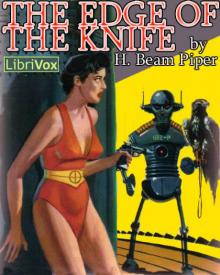 The Edge of the Knife
The Edge of the Knife Genesis
Genesis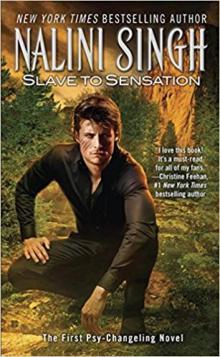 A Slave is a Slave
A Slave is a Slave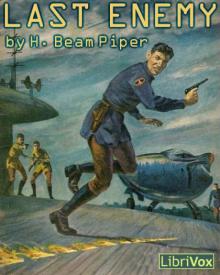 Last Enemy
Last Enemy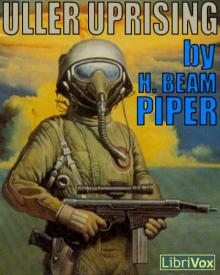 Uller Uprising
Uller Uprising Ministry of Disturbance
Ministry of Disturbance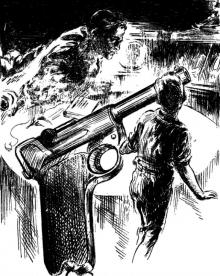 Time and Time Again
Time and Time Again The Mercenaries
The Mercenaries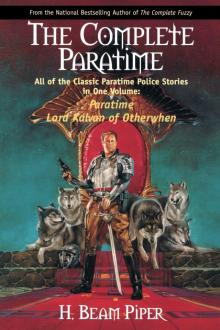 Police Operation
Police Operation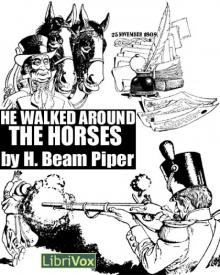 He Walked Around the Horses
He Walked Around the Horses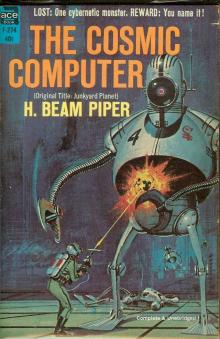 Time Crime
Time Crime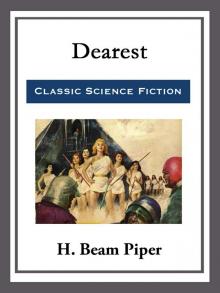 Dearest
Dearest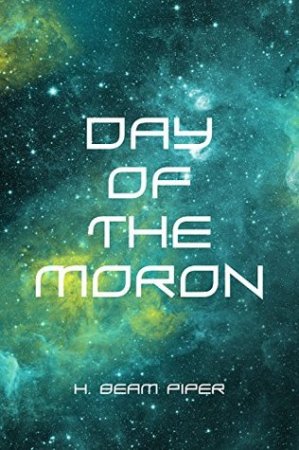 Day of the Moron
Day of the Moron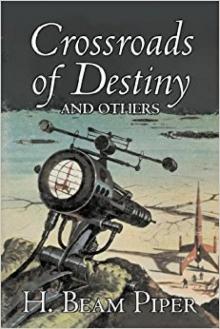 Crossroads of Destiny
Crossroads of Destiny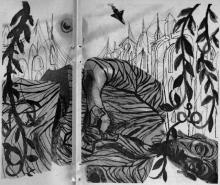 Graveyard of Dreams
Graveyard of Dreams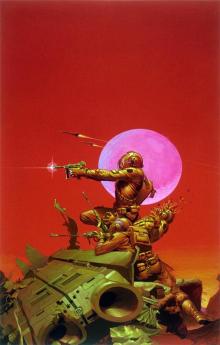 The Cosmic Computer
The Cosmic Computer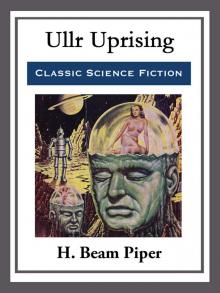 Ullr Uprising
Ullr Uprising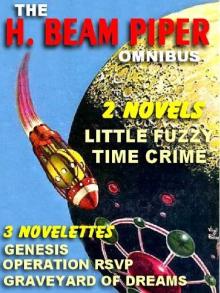 Operation R.S.V.P.
Operation R.S.V.P.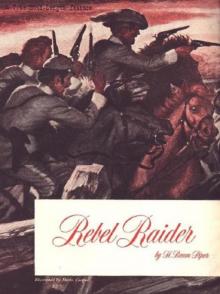 Rebel Raider
Rebel Raider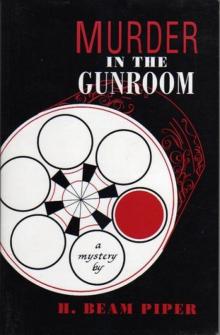 Murder in the Gunroom
Murder in the Gunroom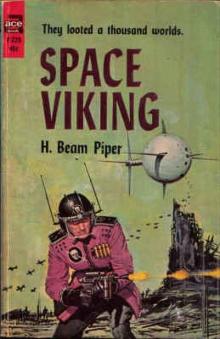 Space Viking
Space Viking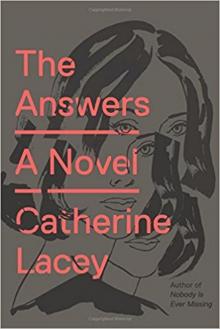 The Answer
The Answer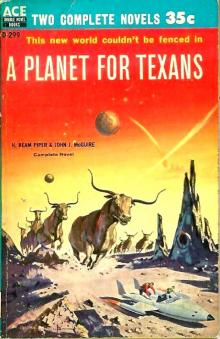 A Planet for Texans (aka Lone Star Planet)
A Planet for Texans (aka Lone Star Planet)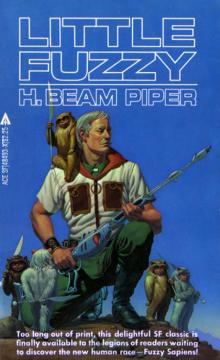 Little Fuzzy
Little Fuzzy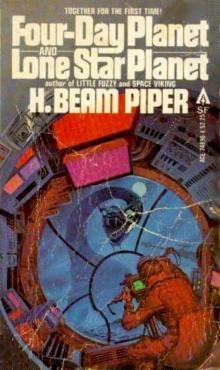 Four-Day Planet
Four-Day Planet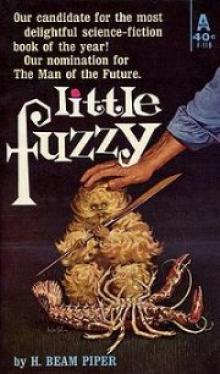 Little Fuzzy f-1
Little Fuzzy f-1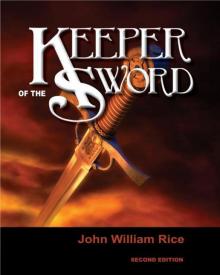 Keeper
Keeper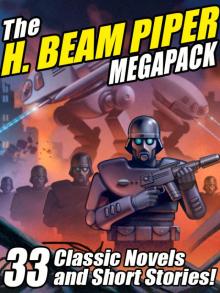 The H. Beam Piper Megapack
The H. Beam Piper Megapack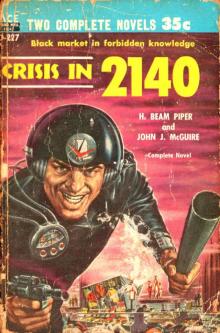 H. Beam Piper
H. Beam Piper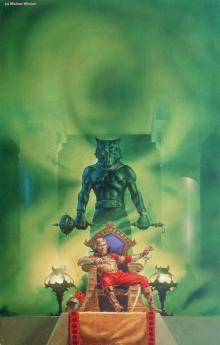 Lord Kalvan of Otherwhen
Lord Kalvan of Otherwhen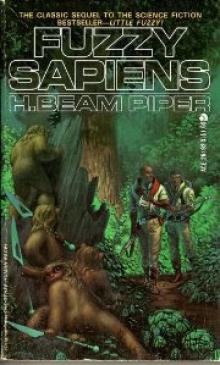 Fuzzy Sapiens f-2
Fuzzy Sapiens f-2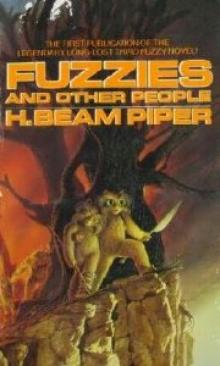 Fuzzies and Other People f-3
Fuzzies and Other People f-3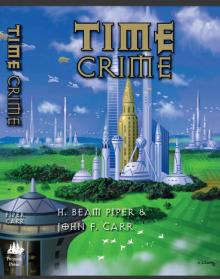 TIME PRIME
TIME PRIME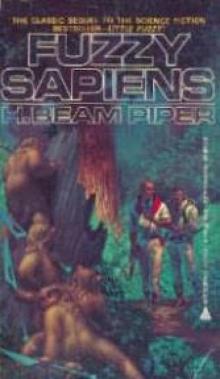 Fuzzy Sapiens
Fuzzy Sapiens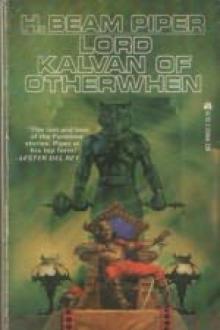 Lord Kalvan of Otherwhen k-1
Lord Kalvan of Otherwhen k-1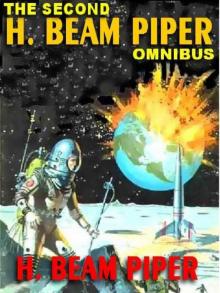 The Second H. Beam Piper Omnibus
The Second H. Beam Piper Omnibus